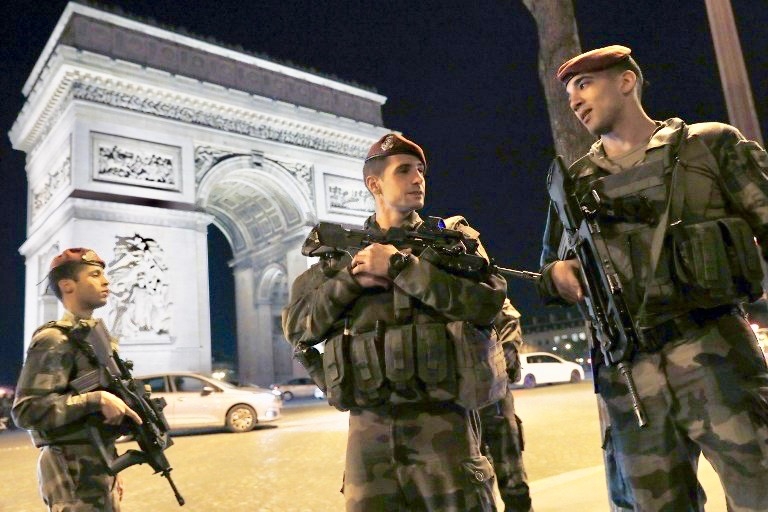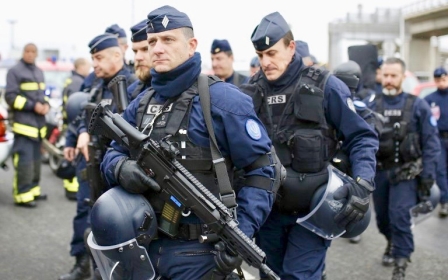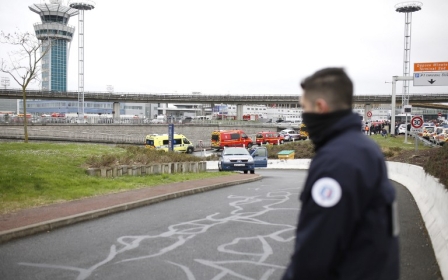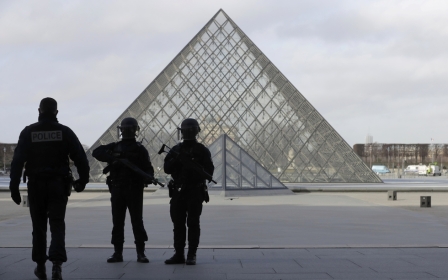IS claims deadly attack on Paris police days before election

A known suspect shot dead a police officer and wounded two others on Thursday on Paris's Champs Elysees in an attack claimed by the Islamic State (IS) group days before France's presidential election.
The gunman, identified as Karim Cheurfi, opened fire on a police vehicle parked on the Champs Elysees in Paris late on Thursday, killing one officer and injuring two others before being shot dead.
Cheurfi, a French national who lived in the eastern Paris suburb of Chelles, had been convicted for previous armed assaults on law enforcement officers going back 16 years, the sources said, and was well known to authorities.
In addition to the assault rifle used in the attack, he had a pump action shotgun and knives in his car, the sources said. Three of his family members have been placed in detention, the French interior ministry announced on Friday.
While in detention, Cheurfi had also shot and wounded a prison officer after seizing his gun. Eventually freed after serving most of his sentence, he was arrested again this year on suspicion of preparing an attack on police - but released for lack of evidence.
President Francois Hollande said he believed the shooting, which prompted tourists and visitors to run for their lives, was an act of terrorism.
After killing the officer and wounding his colleagues, the gunman was shot dead by return fire while trying to flee on foot, police sources told AFP.
"The perpetrator of the attack in Champs Elysees in central Paris is Abu Yussef the Belgian and he is one of the Islamic State's fighters," said an IS statement published by its propaganda agency Amaq.
Another suspect sought by France turned himself in to Belgian police in Antwerp, France's interior ministry said on Friday.
TV footage on Thursday showed the Arc de Triomphe and the top half of the Champs Elysees packed with police vans, lights flashing and heavily armed police shutting the area down after what was described by one journalist as a major exchange of fire.
Observers had long feared an attack ahead of Sunday's election in France, following a series of atrocities since 2015 that have claimed more than 230 lives.
The impact on the attack of one of the most unpredictable contests in decades is unclear, but far-right leader Marine Le Pen and scandal-hit conservative Francois Fillon immediately cancelled their campaign events on Friday.
Up until now, polls showed voters more concerned about unemployment and their spending power than terrorism or security, though analysts had warned this may change in the event of further bloodshed.
The shooting comes two days after the arrest of two men in southern Marseille with weapons and explosives, suspected of preparing an attack to disrupt the campaign, which concludes on Sunday.
Hollande promised "absolute vigilance, particularly with regard to the electoral process" and paid tribute to the police.
'The first responsibility of the president is to protect'
- French presidential candidate Emmanuel Macron
Le Pen earlier welcomed security moving to the heart of the campaign on Thursday as she took part in a prime-time interview show alongside 10 other presidential candidates.
"We are suffering the consequences of a laxity that has continued for years," she said shortly before the shooting, promising to take a hard line against militants.
For weeks, centrist former banker Emmanuel Macron and Le Pen have been out in front, but opinion polls now show there is a chance that any of four leading candidates could reach the second-round runoff on 7 May.
Though Le Pen and Macron are the frontrunners, conservative candidate Fillon and far-left firebrand Jean-Luc Melenchon have closed the gap substantially in the last two weeks.
"The first responsibility of the president is to protect," Macron said on the interview show. "This threat will be part of our daily lives in the next years."
As the first details filtered through, US President Donald Trump sent his condolences and said that "it looks like another terrorist attack. What can you say? It just never ends."
The bustling shopping street in the heart of the city was immediately blocked by armed officers after the attack and nearby metro stations were closed.
"We had to hide our customers in the basement," Choukri Chouanine, the manager of a restaurant near the site of the shooting, told AFP, saying there was "lots of gunfire".
A spokesman for the interior ministry, Pierre-Henry Brandet, paid tribute to the fast reflexes of police at the scene who managed to kill the gunman and prevent further bloodshed on a busy spring-time evening.
A tourist was slightly wounded in her knee during the shooting, said a police officer.
"We face a particularly high risk of terrorism," Brandet told reporters.
France is in a state of emergency and at its highest possible level of alert and has been since the attacks began in 2015.
The magazine Charlie Hebdo was hit in January 2015, sites around Paris including the Bataclan concert hall were targeted in November the same year and families at a fireworks display in Nice last July last.
In between, there have been a series of smaller attacks, often aimed at security forces.
Thousands of troops and armed police have been deployed to guard tourist hotspots including the Champs Elysees and other potential targets such as government buildings and religious sites.
In February, a man armed with a machete in each hand attacked soldiers on patrol at Paris's Louvre Museum. The attacker, a 29-year-old Egyptian, was seriously wounded.
And in March, a 39-year-old man was killed at Paris's Orly airport after attacking a soldier.
New MEE newsletter: Jerusalem Dispatch
Sign up to get the latest insights and analysis on Israel-Palestine, alongside Turkey Unpacked and other MEE newsletters
Middle East Eye delivers independent and unrivalled coverage and analysis of the Middle East, North Africa and beyond. To learn more about republishing this content and the associated fees, please fill out this form. More about MEE can be found here.




